Race radio: US Continental teams weigh in on debate
USA Cycling prepares to return radios to NRC events
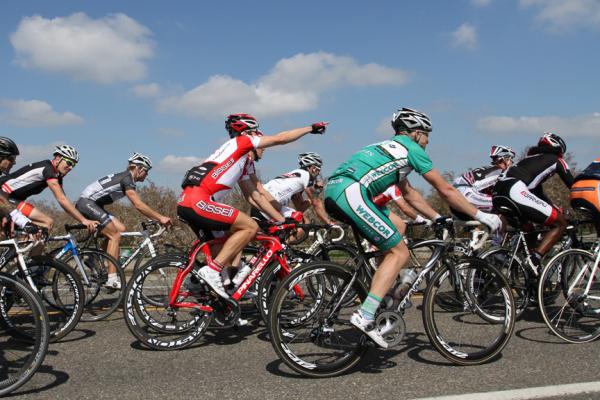
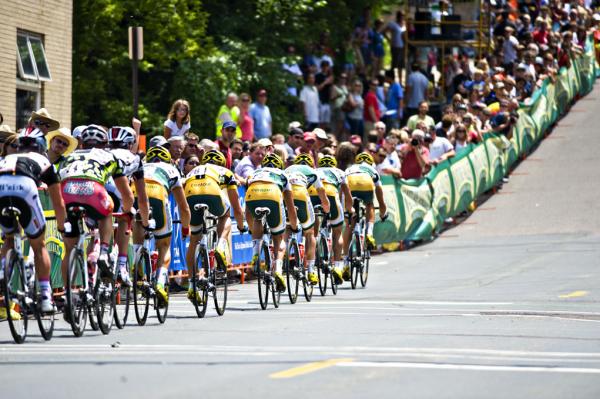
The majority of the ten US-based International Cycling Union (UCI) Continental teams voiced a positive response to USA Cycling's decision to reinstate race radios during National Racing Calendar (NRC) events.
Radios have been banned since last year after the UCI instituted the rule that phased out radio communications between teams and their riders during all but the top-tier UCI events. This included national events not sanctioned by the UCI, and USA Cycling dutifully fell in line with the regulations last February.
However, since then, teams and riders have increasingly cited safety issues as a reason to go against the ban, and a movement at the sport's top tier of professional teams has only served to push for the return of radios.
Wowever, USA Cycling's decision is not being taken lightly by the UCI, and reports of the governing body sending a purportedly threatening letter to USAC have fueled speculation as to whether or not radio use can actually resume.
Andrea Smith of USA Cycling would not reveal the contents of the letter, but would only confirm it had been received. "We did receive a letter from the UCI which pointed out their position on our decision to allow race radios in National Racing Calendar events," Smith said. "We will work with the UCI and the American cycling community moving forward to find the best possible solution for all parties."
Below are a series of reactions regarding the whether or not race radios should be permitted from the nation's UCI Continental outfits Bissell, Jamis-Sutter Home, Kelly Benefit Strategies-OptumHealth, Exergy, Wonderful Pistachios, Kenda/5-hour Energy p/b Geargrinder, Jelly Belly p/b Kenda, RealCyclist.com, Trek-Livestrong U23 Team and Chipotle Development Team.
Glen Mitchell (Bissell Pro Cycling)
Get The Leadout Newsletter
The latest race content, interviews, features, reviews and expert buying guides, direct to your inbox!
"I'm for having radios reinstated at national level races and higher, as soon as you get pro level teams involved, there are more spectators, the race caravan, so it is without a doubt that radios make for a safer racing environment. This has been documented extensively already and they help alert riders to traffic on the race course, dangers in road conditions and crashes that are unseen by the officials.
"Also, this stops riders from each team from going back into the caravan environment to get race information. The caravan is not a place where riders should be coming back to every few minutes. Punctures, mishaps and crashes, with radios the riders are able to communicate direct to the team about what the status is and what is needed, front wheel? Rear? Nothing, all our riders are good? Without this it is a free-for-all when a crash happens, all team vehicles are racing to the same scene, these are the hectic moments that become more unsafe also.
"I do agree with radio ban at local races that don't involve race caravans and multiple pro teams, this is the learning environment for the individual and up-and-coming riders, they learn basic tactics, bike handling and get a feel for race instinct. Once they turn pro the racing is structured a lot differently, it is all about the team and not the individual. This won't change now that we are in the pro team era of this style of racing.
"With radios at our continental level we can actually teach the young pros more as we have communication right when the race is evolving and we can discuss what we want to do, how to do it, and why we do it, right there in the race. Without the radio, learning at this level is a lot slower and takes longer for the new riders to develop. Again, it is all about the team at this level and above. I don't see any reasons why they should be banned at national level (NRC) races and above."
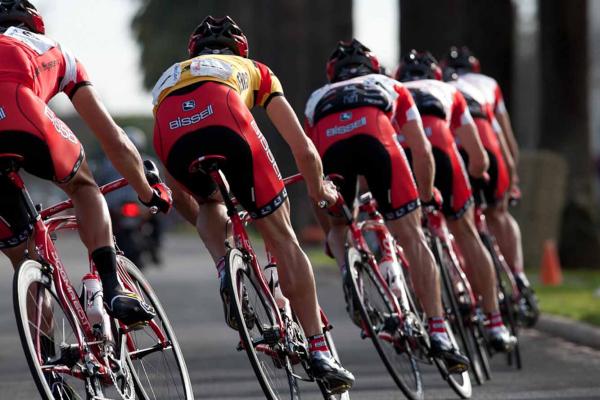
Sebastian Alexandre (Jamis-Sutter Home)
"I am happy that the radio use came back. The main reason is for the safety of the riders, as we all know. After one year of not using them, I don't think it changed the style of the racing or the tactics in the US. So, I do not think there is a good reason to continue not using race radios. It was good to try, but I'm happy with this decision. I think we have lost more by not using race radios than we have gained from not using them."
Jonas Carney (Kelly Benefit Strategies-OptumHealth)
"I am actually on the fence at the moment. There are advantages to having radios and advantages to not having radios. On the one hand, radios give an unfair advantage to dumbasses and teams consisting of dumbasses who would never win any races if they didn't have someone in their ear telling them what to do. Radios also contribute to the races being more controlled and predictable and that's not good for the sport.
"On the other hand, there are occasions where radios can make things safer for the athletes. This is especially true in the caravan when dealing with crashes, mechanicals, and feeding. Unfortunately, not all race organizers and officials create the safest environments for the athletes and each year we have our fair share of unnecessarily dangerous situations.
"So, I'm on the fence. We all want exciting and dynamic racing and it's always fun to watch a savvy rider or team outsmart the competition. However, there have been times in the caravan over the last year when I wished I could have communicated with my guys for safety reasons. Whatever the UCI and USAC decide, our team will abide by the rules."
Josh Horowitz (Wonderful Pistachios)
"I agree with USA Cycling's decision to lift the radio ban on the NRC. While it may give the bigger teams an even bigger advantage, it definitely makes the sport more interesting and with the current and somewhat ailing condition of cycling, viewership and participation should be everybody's primary concern.
"Race strategy in cycling has evolved over the last 100 years into a beautiful symphony with hundreds of carefully crafted permutations and intricate variations. The technology that is being used in the caravan, including the race radio, is what has allowed the sport to develop so successfully. I think hardcore cycling fans could go either way on the issue but for the casual fan and the uninitiated, the realization of the complexity of the sport is often what draws them in.
"In terms of the worldwide ban on radios, it's frustrating for team directors like myself who are constantly searching for funding, when the powers that be make a rule that flies in the face of what is becoming increasingly difficult to do. The biggest concern we all should have right now is keeping the sport alive and kicking. I hope that riders continue to protest and that the rule is overturned."
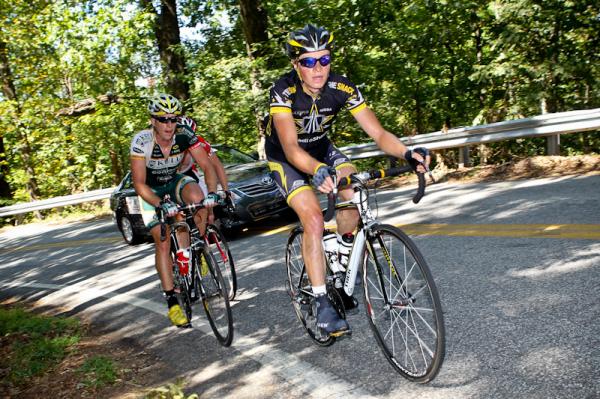
Gord Fraser (RealCyclist.com)
"Last year, when it was apparent that USA Cycling was going to follow the UCI decision to ban race radios, Mike Tamayo [Directeur Sportif of UnitedHealthcare Pro Cycling] and I were very much in favor if keeping the radios. Not having race radios is a liability and getting rid of them will increase liability. We can argue whether or not the radios play a factor in racing tactics, that is a vague area, but the safety issues are very real. In the US, some events are very remote and the infrastructure is not there to make the racing safe enough. The majority of the information that gets filtered back to us comes from the racers.
"If there are crashes in the race we find out about them quickly from the riders and we are able to provide assistance to the riders quickly. Our reaction time to solve problems for crashes, flat tires, water bottles or rain gear is faster when the riders are able to tell us about them. Without race radios we are at the officials control in order to find out what is happening in the race and often times important information arrives very late or not at all. Our reaction times to performing important tasks were greatly increased last year because of the radio ban.
"At the Tour de Beauce last year we went through a horrible section of dirt road that no one knew about and there were a lot of bad crashes. If we had race radios, we could have easily given the riders a heads up but by the time the officials learned about the dirt road we were two kilometres away from it and unable to give this information to our riders. Sure enough, there were some very bad crashes. We need to give the riders every chance to be safe.
"By banning the radios, it is taking away the service of the directeur sportif. We have jobs as ex-racers because we have a lot of experience and we can provide teams with the experience. Not having radios took that part of directing role away and made it more of an administration role. Also, we've been using radios for 13 years so why is it all of a sudden a bee in the bonnet of the UCI. Riders are used to having them, they like them and if everyone has a radio there is no disadvantage. The ban didn't make any sense, it was very regressive and I didn't understand the logic to it. I'm happy the radios are back and that USA Cycling is listening to its constituents."
Tad Hamilton (Team Exergy)
"My personal opinion on race radios is that they are unnecessary. Even worse, they decrease the exciting dynamics of bike racing. The sport survived and thrived for 100 years before Motorola introduced these communication pathways, and last year's radio ban did nothing to damage the growing popularity of racing in the United States. The teams that function smoothly still manage to disseminate important race information to the squad through the conventional method of road captains and visits to the caravan car. A team of well rounded riders is required for success under this format. An engine is only half the equation, and this radio ban identifies the qualities and deficiencies in every athlete.
"The counter opinion cites rider safety as the main concern for the radio ban. On occasion the radios are used to warn the peloton of road hazards or course changes. However, a proper Manager's Meeting covers every kilometre of every stage, and it is during this meeting that dangerous road conditions are addressed. Obviously, a dog in the road can never be predicted, but the riders at the head of the peloton owe it to their fellow competitors to make the group aware of unpredictable dangers.
"The rider safety issue is a whitewash for directors who lack trust in their athletes to make solid decisions during the heat of competition.
"Having said that, it appears that this topic is much larger than just a radio ban. The root of the argument seems to be more about earning a voice for teams and riders among the rule makers than it is about rider safety or tactical information exchange. Professional teams and riders want at least a small voice in the direction of the future of bike racing. In regard to this more complex issue, I am 100 percent in agreement with my peers. Whether the race radio ban is worthy of the "lightening rod" label is debatable. But what is not debatable is that all sectors of professional cycling should have a say in the future of our beloved sport."
Axel Merckx (Trek-Livestrong Development Team)
"I think it is a great thing to have the race radios back. I think they have a part in cycling. Safety-wise, they are very important for the riders and the caravan. Safety is the major concern, in general. But also for racing purposes, so the riders can have the proper time gaps to managed appropriately. People think that we can push a button and tell a rider what to do in the race, tactically, but that is just off. When it comes down to it, it's the rider who makes the decision, the reactions, they are focused on the race and at the end of the day it's the rider's legs that decide whether they can do it or not. So, I think the radios are important for safety and to give information to the riders."
"Additionally, in some races, the time gaps were not being given to the riders correctly or appropriately last year. We, as directeurs, knew the time gaps from the cars but we couldn't tell our riders what those time gaps were, and for me that is considered false racing. There was very little communication available. For example, the Tour de France has an official with the time board going back and forth for the riders all the time but that didn't happen in most of the races in North America. Some of the event's budgets are not always that high and the organizers are doing the best they can with the budgets they have. We have more of a need for time gaps and general communication, security-wise, so officials can tell us if there is a big rock that falls on the road so we can advise our riders."
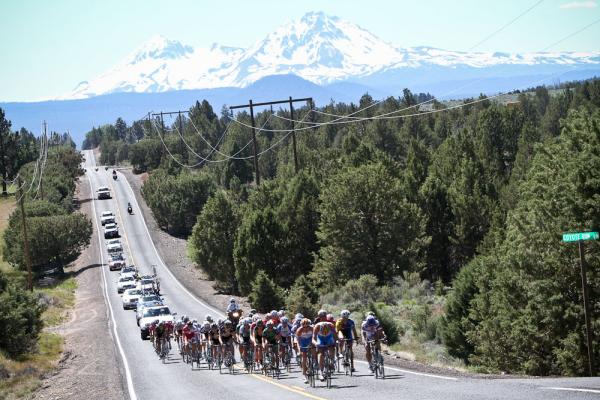
Chad Thompson (Kenda/5-hour Energy p/b Geargrinder)
"While we try to both respect and adhere to all of the UCI's rules, the radio ban has yet to make sense to us. I understood the original ideas and arguments on the UCI's behalf, although I never really agreed the ban was a sound or reasonable tactic. Why remove technology from a sport? Should we have 'restrictor plates' too? Why not listen to the sport as a whole such as managers, owners, riders and entire national federations? It simply made no sense to me, my staff and certainly not our athletes."
"The ban provides only a gap in rider and director communications for things that matter such as a need for food, mechanical issues and most importantly, safety. We had a major issue losing a rider at the 2010 Tour de Taiwan from the neutral support vehicles passing right by him while we (our car) were with our rider in the break and with no way of communicating with our riders. He was lost for an hour in a country he did not know or understand. This could have been solved with one simple press of a radio button. Racing outcomes have not changed the sport in anyway, the favorites still win, the strongest lead-out still captures the breakaway within meters of the finish and the breakaways have not seen any increase or decrease in success based on lack of radio communications."
"In our eyes, it takes away from safety and from the director's responsibilities to insure our riders are tended to properly. We do not want a battle with anyone, nor do we want the USA Cycling to suffer in any way. But, we do agree with their decision and are elated we can use our system again. To us, it is a tremendous weight lifted off of our shoulders. We spend a lot of money with therapists, physicians, batch testing of our nutritional products, soigneurs, etc. Radios are another, if not the most important link to the welfare and safety of our employees, our athletes."
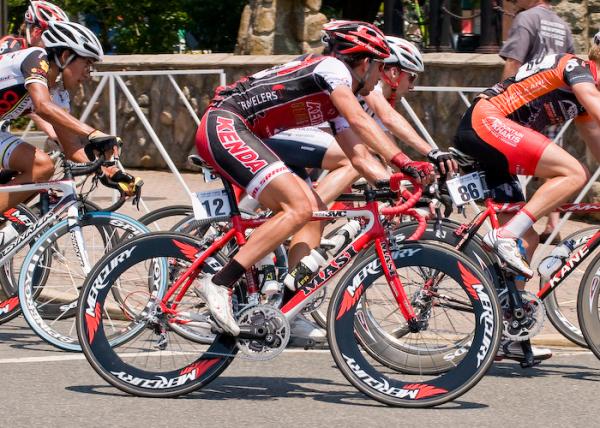
Danny Van Haute (Jelly Belly p/b Kenda)
"The pros about having radios in NRC races, most importantly, is the safety of the riders and vehicles on the road. We had a close call in a race where a car got on the course as the riders were coming down a hill and the car coming up the hill, race radio told the managers to tell the riders about the car, if we didn't have the radios this could have been a huge accident with a rider and a vehicle. The cons are that there are no radios for Juniors and Under 23 races which will not change."
Chann McRae (Chipotle Development Team)
"I completely support the use of race radios for safety purposes. For example there are numerous road hazards that can suddenly appear during a road race. For me to be able to alert our riders is key to reducing a potential problem. Radios make communications quick and efficient."

Kirsten Frattini is the Deputy Editor of Cyclingnews, overseeing the global racing content plan.
Kirsten has a background in Kinesiology and Health Science. She has been involved in cycling from the community and grassroots level to professional cycling's biggest races, reporting on the WorldTour, Spring Classics, Tours de France, World Championships and Olympic Games.
She began her sports journalism career with Cyclingnews as a North American Correspondent in 2006. In 2018, Kirsten became Women's Editor – overseeing the content strategy, race coverage and growth of women's professional cycling – before becoming Deputy Editor in 2023.